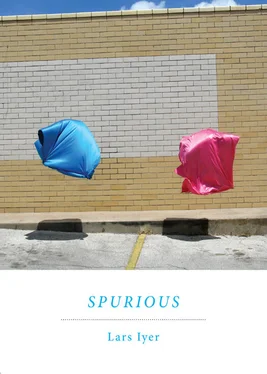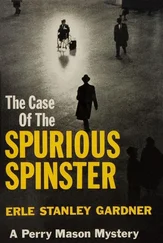But then, too, he must have wanted to humiliate himself in some sense, even as he was drawn to me as the means of that humiliation. What crime has he committed? Why did he want to place himself on trial? His immense sensation of guilt is mysterious, W. says, but it led him straight to me, his judge, his guillotine.
Overpraise is the answer, W. says. We should only speak of each other to others in world-historical terms, he’s always been insistent on this. These are dark times, after all. No one’s safe. — ‘These are the last days’, W. says. ‘No one could think otherwise’. And then, ‘It’s all shit, it’s all going to shit. It will always have already been shit’, W. says, as I take a photo of him by an evangelist with a placard saying end times .
Overpraise is all we have, W. always says, that and sticking together. We have to be a pack, a phalanx prepared to die for one another. — ‘I’d die for you’, says W., quite serious. ‘What about you — would you die for me?’ That’s what friendship demands, says W. Of course, I would never say I would die for him, says W. He knows me. I’m incapable of that kind of sincerity. Or love. I’m incapable of love, W.’s always been insistent upon that.
In a moment, I would break the phalanx and be off somewhere else. I’d betray him straight away, W. says. Whereas he’s always been very careful to overpraise me to others, he says. You have to. There are enemies everywhere, he says. I have enemies and so does he. And then there’s the whole system, says W., which creates enemies instead of friends and enemies of friends. Betrayal is his greatest fear, says W.
How’s the damp? W. asks me on the phone. The plumber says he’s seen nothing like it, I tell W. The brick’s crumbling, he said. And if it crumbles? The flat upstairs will come down on top of this one, that’s what he said. But then my flat is slowly tilting into a mineshaft, into which they might both disappear. It’s like being on a ship, I tell him, when it tilts one way as it rides the waves. But it never rights itself. It’s always leaning to starboard. In any case, I’m fit for nothing anymore, I tell W., except rocking back and forth as the mildew spores float around me and the slugs leave trails on the wooden floors.
Then there’s the leak below the house, I tell W. You can hear the water streaming. The plumber said it might be spraying up into the walls, and that that might be the cause of the damp. It’s like acid, the plumber said, it’s eating the brick away. I should do something about it. — ‘Can you hear it?’, he said, turning off the stopcock, and going up to the flat above mine to turn off their stopcock. ‘Well, can you?’ And he’s right. There’s a great streaming, a rushing. Water somewhere close and rushing, spraying up into the wall and rotting it from within.
The plumber pitied me so much I had to press money on him, I tell W. He didn’t want to take it. He’d never seen anything like it, he said, standing, looking up at the ceiling. He seemed hypnotised. He wouldn’t leave, but just stood there, looking. And even when he went out the front door, he was still shaking his head. — ‘Howay, it’s terrible, man’.
Meanwhile, I throw out my pots and pans, which are rusting in the kitchen. Nothing is salvageable. The tins in the cupboards rust into the shelves. The washing powder box has liquefied. The walls, once a new, replastered sand, have turned deep brown, and in places, green. All along the window ledge: deep green. What horror! And small snails sometimes fall through the hole in the ceiling, I tell W., but I don’t mind that.
And there’s mildew, mildew everywhere, spreading, its spores drifting through the air. Perhaps I’ll become tubercular, I tell W., and that will be the making of a true European intellectual. But in truth, when I cough — and I do have a hacking cough that won’t leave me — it drives the few thoughts I have from my head, I tell him. W., who is also ill, is likewise disappointed with his cough. He’s just ill, he says, and it doesn’t help with his thinking.
These are truly the last days, W. says, over honey beer in Cawsands. How long do we have left? — ‘Oh, not long. We’re fucked, everything’s fucked’. This as we look out to sea. — ‘But we’re essentially joyful’, says W., ‘that’s what will save us’. And then, ‘Actually, it won’t — we’re too stupid. We’ll be the first to go under’.
Where did it all go wrong? muses W. We both know the answer: literature! If only we understood mathematics! If only we were mathematically inclined!
W. has books about maths, and every year he tries to read them. — ‘I can never do differential equations’, he says. It’s like Greek: every year he tries to learn the language, but falls at the aorist. — ‘The aorist breaks me every time’, says W. We list the names of our friends who are mathematically inclined, and sigh. — ‘They’ll amount to something’, says W., ‘we won’t’.
But what we do have, says W., is joy. We are essentially joyful. I agree. — ‘We are content with very little’, W. says, ‘it doesn’t take much to keep us happy’. The inane are happy, we agree. We are quite content, as idiots are. — ‘I think that’s what you’ve given me’, says W., ‘idiocy’.
We’ve always known our limitations, W. and I agree, which is very different from accepting them. In fact, our entire lives have been concerned with not accepting our limitations, and battering ourselves against them like moths against a window.
Our limitations fascinate us, we agree. From the first, we aimed ourselves against them, in defiance not of the world that expected something from us, but of our own expectations.
Of what did we think we were capable? From whence came that ferocity of hope? Ours is a very pure kind of idiocy, we agree. We’re idiots, we agree, idiots who do not quite understand the depths of their idiocy. We’re mystics of the idiotic, we agree, mystical idiots, lost in our cloud of unknowing.
Idiocy, that’s what we have in common. Our friendship is founded upon our limitations, we agree, and doesn’t travel far from them.
We’re full of joy, W. says as we walk back from the supermarket, that’s what saves us. Why do we find our failings so amusing? But it does save us, we agree on that; it’s our gift to the world. We are content with very little: look at us, with a frozen chicken in a bag, and some herbs and spices, walking home in the sun. The gift of laughter, I say. — ‘The gift of idiocy’, says W.
‘These are truly the last days …’ W. is making me listen to Godspeed’s Dead Flag Blues again. ‘Shut up and listen’. He plays this to the students, he says. And he makes them watch Béla Tarr. That’s what he calls teaching, he says.
The last days! What are we going to do? — ‘We’ll be the first to go under’, says W., ‘we’re weak. Gin?’ Yes to gin, no to the apocalypse. What time is it? Already late, though you can never be sure in the shuttered living room.
Rosenzweig wrote the entirety of The Star of Redemption on postcards to his mother, W. says. All of it, every line, from the Macedonian front, where he was fighting. Admittedly, there wasn’t much to do at the Macedonian front — that’s not where the big battles were, but nevertheless. An entire book! Written on postcards! One after another! To his mother! W says.
Rosenzweig! He’s the measure of all things to us. The measure of commitment (he meant every word!). The measure of religiosity. The measure of integrity. He turned his back on the university! says W. He devised a new form of educational institution! He taught young Jews … He lived what he thought. He acted on what he thought, which is inconceivable to us now (as is even the capacity to think).
Читать дальше












